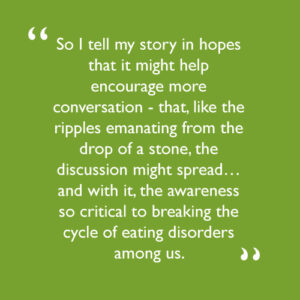“This is a family disease,” my father told me solemnly, “so we’ll treat it as a family.”
This was one of the first conversations my parents and I had after they finally confronted me about my eating disorder. I don’t remember much about the other conversations, but this one I recall vividly. I remember feeling trapped somewhere between paralyzing fear, tentative relief, and fiery defiance. I simultaneously hated the offer of help that I needed more than I knew, and longed for the love and support that I felt I didn’t deserve. Struggling to put this overwhelming inner battle into words, I looked my parents square in the eyes and said, “Okay. But it won’t be easy - I’m going to fight against you every step of the way.”
I can’t even imagine how this must have made my parents feel. Their eldest daughter, once so bright and eager to please, appeared to be declaring war against them. The stakes? Her life. What they didn’t seem to realize - and  what I couldn’t seem to express - was that I felt like a captive of the merciless enemy they proposed to fight. I was a prisoner inside my own head, watching myself slowly starve and exercise to death but unable to stop, no matter what I tried.
what I couldn’t seem to express - was that I felt like a captive of the merciless enemy they proposed to fight. I was a prisoner inside my own head, watching myself slowly starve and exercise to death but unable to stop, no matter what I tried.
What most people don’t understand is that an eating disorder isn’t a choice, misguided or otherwise. It isn’t a phase or a fleeting affair. It’s a disease that, like addiction, traps its victims with a host of lies and impulses that they cannot control. It consumes and controls every aspect of life until nothing but those horrendous lies remain. Though it may slip in unnoticed. sooner or later it progresses to a point where its consequences cannot be ignored. The “drug” of anorexia, bulimia, and other eating disorders no longer provides a sense of relief from whatever pain it used to numb - it becomes the source of the pain, only now it’s a pain that nothing else can relieve.
And yet by the time my disease had reached this point, long before my parents confronted me, I was powerless against it. I wanted to stop, but no matter what I tried, I couldn’t. I would wake up in the morning with the most iron-clad determination to eat like a normal person, but by the end of the day I would have failed miserably. I, who could apply myself brilliantly to any other task, simply could not overcome this irrational fear of gaining weight, of eating, of losing control.
This is what lay behind my words that fateful day of confrontation. It wasn’t that I wanted to rebel against my parents’ love and concern, nor that I had no desire to get well. It was that, deep down, I knew that I was powerless against my disease, and it would take so much more than this fateful conversation to beat it.
That was nearly eight years ago. But miraculously, my recovery since then has culminated in health and happiness, freedom from the agony of anorexia for the past four years. How? Through the support of a family and a few incredibly patient health practitioners who finally came to understand the true nature of my disease. Through my own personal admission of powerlessness, but not helplessness, for I had to take responsibility for my recovery even after I surrendered control. Through active surrender of my food, body weight, and exercise, trusting that the balance lifestyle I’ve learned through those who support me will sustain my body at the shape and size it’s meant to be. This disease is one I cannot fight alone, but with help, I can be free.
[dt_divider style="narrow"/]
Alison is a regular contributor to The Looking Glass’ blog, is an eating disorders survivor and is an inspiration to those around her.